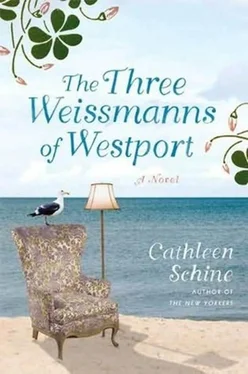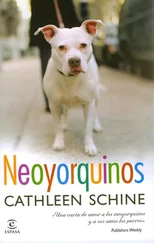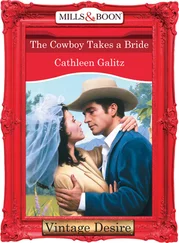Miranda determined that the best place to reexamine her soul was on the beach at dawn. It was unfortunate that Compo Beach was so small, perhaps a half mile from end to end. She found that just as she thought she might be getting somewhere, striding along on her reexamination, she would reach the jetty and have to turn back. Then she would be distracted by the sky, turning from purple darkness to its milky violet morning wash, then bursting into bright pink streaks. Each day the sky was a little different, and therefore that much more distracting. Some days she would see an unlikely flock of green parrots in the parking lot, a convocation so odd and busy and noisy that any examination, or even recognition, of the soul was rendered temporarily impossible. And then, just as she was passing the playground, her feet in the cool sand, the salty air in her lungs, gaining just a little ground on her elusive soul, Miranda's cousin's big Cadillac Escalade would pull up and Cousin Lou would roll down the window and holler hello, frantically waving a pink palm, he was just on his way out and wondering if she would like a lift anywhere.
"No," she would say. "Thanks so much, but I'm just taking a walk." As you see. As we discussed yesterday morning, when you stopped to ask me the same question.
"Walking!" Cousin Lou would exclaim. "Such good exercise." And he and his big black car would purr off into the dawn.
Miranda tried to avoid Cousin Lou as much as possible. It was not that she disliked him. It was not possible to dislike Cousin Lou. He lived to be likable. But he was not introspective, and Miranda was engaged in a course of introspection that required not only her own attempt to examine her soul but an assumption, typical of her, that, therefore, everyone must of course be examining, if not their own souls, then at least hers. Cousin Lou, however, was not interested in her soul any more than he was in his own. As he explained to Miranda, "If Mrs. H. had wanted immigrant children to examine their souls, she would have withheld the funds required for them to do so."
After a week or so of these aborted soul-searching walks, Miranda hit on a new idea. Walking on a suburban beach was insufficiently lonely. There were far too many interruptions. She must go out to sea to be truly contemplative. As she realized this, she was watching a yellow kayak slide across the horizon. That was the answer, of course. In a kayak she could be alone, undisturbed. A sea kayak could take her all along the shore. She could explore the tidal areas at Old Mill, at Burying Hill beach, all along the Gold Coast to Southport, where one of her writers, the radio talk-show host who had been fired two months ago for referring to a female African American Cabinet member as Little Black Bimbo, had once lived.
On Craigslist, Miranda found kayaks for sale from the sailing school at Longshore, Westport's public country club, for $395.
"Is that a bargain?" Betty asked. "I'm sure it must be."
"On the other hand, hand-me-downs never fit well, do they? Perhaps a new one would be safer."
"Shouldn't you rent a boat first?" Annie asked. "Take lessons? You've never been in a kayak in your life."
"I thought you wanted to save money! Lessons are expensive."
"Lessons! It's not as if your sister's training for the Olympics, Annie."
But Betty could see Annie was upset, and at the first opportunity she took her aside and placed her hand firmly on Annie's arm, as she had always done when the girls squabbled as children.
"Miranda needs to search her soul," Betty then gently explained. "Now, sweetheart, how is she supposed to do that without a nice new kayak?"
What Betty didn't explain was that she would have paid almost any sum of money, whether she had it or not, to get Miranda out of the cramped bungalow for at least part of the day. It was true that she was happy to spend time with Miranda. It had been a lifetime, it seemed, since she had been able to say good morning to her daughters and to say good night, too. And Miranda was good company. It was a miracle at this age to have her talented, interesting, grown-up daughter there, every day, in the house, to share a pot of coffee, a salad for lunch, a pot of tea in the afternoon. On the other hand, Betty had noticed that it was invariably she who made the coffee, the salad, and the tea. Miranda, once so capable and busy in her life in New York, still so energetic about her soulful walks, was limp and helpless around the house.
Betty would never let her daughter see her concern. Miranda needed her to be strong. But her heart went out to Miranda, and she lay awake at night wondering what would become of her pretty, vivacious, irresponsible daughter, so alone in the world, no husband, no children. And now, no authors either.
She knew Miranda was broke or, as Miranda preferred to put it, "temporarily unable to access funds," which must be terribly frustrating considering all her success. There was an awful, endless, complicated lawsuit that had frozen all of Miranda's assets. As if they were so many lamb chops, Betty thought, imagining the assets wrapped in aluminum foil and coated with a white film of ice.
Poor Miranda had never been very good with money. Joseph had always been telling her to save more. But Miranda would just laugh and say that money was not the goal, it was the means, then set off on another eco trip, spending tens of thousands of dollars to go someplace whose claim to fame was that it had gray shower water and you had to put your toilet paper in the wastebasket… Oh, it was all incomprehensible. If Joseph had been alive, he would have explained it to her, but since Joseph had died so tragically, Betty was left in ignorance to watch with a broken heart as her daughter worried about money. Miranda had never worried about it before, and now that it was all gone, it seemed doubly unfair to have to worry about something she no longer had.
A kayak might be just the thing to cheer her up. At the very least, it would get her out of the house, leaving Betty a moment to search her own soul without having to jump up to make her forty-nine-year-old daughter tuna fish sandwiches "just the way I like them, Mom!"
Miranda had gotten a call from her former assistant. Out of the goodness of her heart and a residual, reflexive terror at the sound of Miranda's voice, this young woman was still handling Miranda's health insurance from her busy desk at a rival agency, filing Miranda's claims, and she had called to report on a wayward dental bill. Miranda had taken the opportunity to ask her if she could help arrange parking for the new kayak.
"They must have parking lots for these things."
The girl-so well trained in her two years with me, Miranda thought with satisfaction-had found a place right at the beach's marina. There was a fee, but what in life did not have a fee of one kind or another?
The new kayak itself was a bright, shiny red. Miranda's life vest was orange, and the black of the clingy kayaking clothes she'd gotten contrasted nicely, giving the whole, according to an admiring Betty, the appearance of a tropical fish.
That semiretired lawyer, the friend of Cousin Lou's, was at the water's edge fishing "with zero environmental impact," he assured her, showing his fishless basket. She had initially tried to ignore him, but as soon as he saw her struggling with the kayak, he lowered his fishing pole and helped her get the boat into the water.
She shot away from the shore, a streak of color against the slate gray water of Long Island Sound in the early dawn. The wind was cold. Bracing, she thought as she paddled into it, passing Compo Beach. How insignificant the beach looked from the water, even smaller and slighter than from the curve of sand itself. She had Googled some maps of the coast. Coming up was Sherwood Island, which was not an island at all but a state park. She had never been there. But she had driven to Burying Hill beach, the minuscule bit of sand up ahead on her left. There were wetlands there, enfolding several large architecturally uncertain houses that had somehow been allowed to spring up in the last twenty years. She headed her little craft toward the inlet that led to the pretty marsh.
Читать дальше












